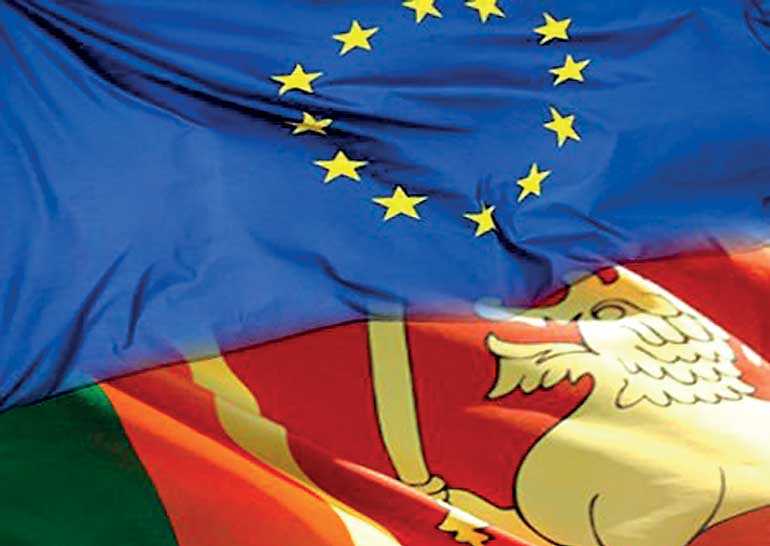Thursday Feb 26, 2026
Thursday Feb 26, 2026
Thursday, 20 December 2018 00:00 - - {{hitsCtrl.values.hits}}

By Srimal Fernando and Mizly Nizar
EU-Sri Lanka relations started as early as in 1975 with the signing of a commercial cooperation agreement between the European Commission (EC) and Sri Lanka. The relationship was further strengthened in 1995 with the agreement on partnership and development. Sri Lanka’s Gross Domestic Product (GDP) is around $ 87 billion with a GDP per capita of about $ 4,000 whereas the average GDP per capita of EU member states is around $ 36,500.
Sri Lanka is a beneficiary of Official development assistance (ODA) granted from EU states designed to promote economic development and welfare of developing countries. However, this assistance is focused on the very poorest countries, most of which are in Sub-Saharan Africa. As Sri Lanka has become more prosperous and very soon is likely to become an Upper Middle Income country, many donors are increasingly shifting their assistance to other countries. Hence developing nations like Sri Lanka are being advised by IMF and the World Bank to promote development by trade rather than by aid.
In its economic relations with the EU in the recent past, Sri Lanka has seen growth in the areas of tourism, textiles and the food processing sector. When considering resource endowment, EU nations are advanced in science and technology while Sri Lanka is rich in human capital. Hence, in order to boost future economic growth and development that is mutually beneficial for both the EU and Sri Lanka, ways and means of productive resource utilisation should be considered.
Closer to home, Sri Lanka has signed the Indo-Lanka Free Trade pact which gives Sri Lanka access to India’s 1.3 billion consumer market . In addition, Sri Lanka is also a member of the South Asian Free Trade Area (SAFTA) which provides tariff free trade to the seven nation common market. These agreements along with the Singapore Free Trade pact with Sri Lanka could pave the way for EU goods to access the Asian market.
According to the latest statistics, an average manufacturing worker in the EU, receives about $ 27 per hour in wages while in Sri Lanka an average skilled worker in the motor mechanism sector receives around $ 15 per day.
There are currently six major automobile manufacturing companies in Europe, namely Fiat, Renault, Peugeot, Volkswagen, Ford and other subsidiary companies of General motors. The demand for cars in the EU is estimated to grow by 400,000 per year. Sri Lanka has a labour force with high motor mechanism skills who could provide this vital factor of production at a lower than EU average wage rate to the European automobile industry.
In the future, EU automobile manufacturing companies could invest in joint ventures in Sri Lanka which could then re-export the finished products to larger markets in South Asia or South African nations given Sri Lanka’s strategic location close to the busy East-West shipping route.
Over the years, both, Sri Lanka’s public and private sector have been re-examining a wide range of policies in response to calling for a new strategy in dealing with the EU and its Generalised System of Preferences (GSP) which allows developing countries vital access to the EU market through reduced or nil taxes on exports.
Sri Lanka has greatly benefited from the GSP plus scheme which provides duty free access to the EU which is the country’s largest export market. In 2017 alone, Sri Lanka’s exports to the EU was Euro 2.7 billion. The GSP plus scheme is however conditional on Sri Lanka advancing human rights and working towards sustainable development.
In fact, in 2010, the EU temporarily withdrew Sri Lanka’s GSP plus benefits due to allegations of human rights resulting in a loss of export revenues till its reinstatement in May 2017. Given Sri Lanka’s large external trade deficits, it is vital that the country continues to secure the GSP plus facility in the future years to ensure some stability in the island’s economy.
Hence, on the whole, it is vital that steps are taken to ensure the free flow of ideas and information on trade benefits and ease of doing business between EU member states and Sri Lanka to further enhance economic diplomacy leading towards mutually beneficial economic growth and enhanced development.
[Srimal Fernando is a research scholar at Jindal School of International Affairs (JSIA) India and a Global Editor of Diplomatic Society for South Africa. Mizly Nizar is a foreign policy analyst and a former visiting lecture at the Bandaranaike Centre for International Studies (BCIS) and the Open University of Sri Lanka.]